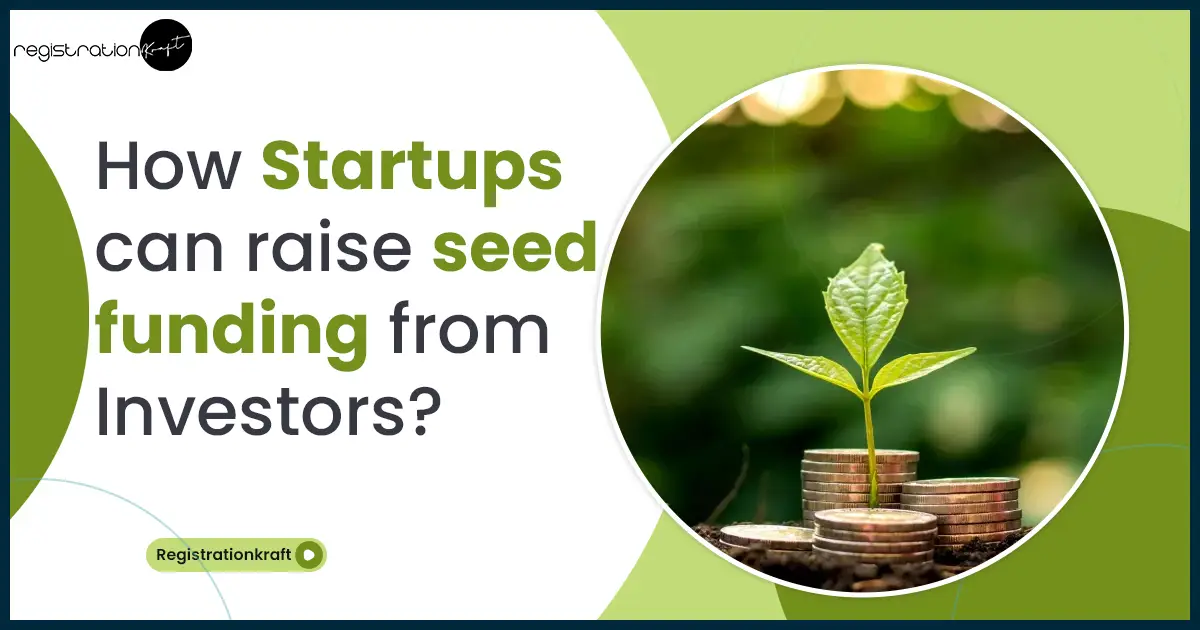How Startups can raise seed funding from Investors?

For a majority of start-ups in India, seed funding has emerged as a wonderful way of arranging funds, particularly during the initial phase of the business. If you are looking to start your business venture and want to arrange funds through seed funding, this post is especially meant for you. From the meaning of seed funding to the ways it would help you, get to know everything right here in this post.
What does seed funding mean?
As its name refers, seed funding is a type of business funding that helps businesses when they are in their infant age. In other words, it can be said that seed funding helps entrepreneurs in getting funds when the business idea is in their mind.
Are seed funding and growth-stage funding the same?
Seed funding can be described as the initial stage of investment for a business. In this type of situation, the business can think of just having a product roadmap which still requires full-fledged validation from stakeholders. As the business is in its early stages and most likely it is yet to prove its value in the market, this funding typically comes with high levels of risk from the investor’s perspective. However, this high risk also strikes at a time when the start-up’s worth is at its lowest and has the capacity to scale and get awesome returns.
Due to this, investors invest money at this level through adaptable preference shares or general equity. They are not likely to resort to debt instruments along with a fixed interest rate load on the startup as the initial-stage start-ups tend to have low weight with no validation on their business layout. In a few cases, grants are also used as a funding instrument but are given by Government schemes or competitions especially developed for the objective of promotion of entrepreneurship.
What is the main objective of seed funding?
It is quite easy and quick to decode the main purpose of seed funding. This type of funding is supposed to give the team behind a wonderful business idea a sufficient amount of money so that the involved members can give wings to that idea and prove its worth. A large number of investors may like to invest in a new business but only if the idea behind is really remarkable and there are higher chances of getting it successful. Therefore, there are several things that a start-up must do to get the required capital through seed funding.
How start-ups can leverage seed funding to meet the capital requirements?
The most important element to keep in mind while looking to raise seed round is to put in place a system and procedure for the same. Similar to a methodical approach to power your sales and marketing funnel, your fundraising efforts should traverse in the right direction.
With respect to fundraising, it can be compared to a conventional sales and marketing conduit for a B2B business. Typically, a traditional sales & marketing process can be divided into 3 steps:
- Inviting and including competent leads to your top of the funnel regularly.
- Cultivating and shifting the leads from through the funnel as a bid to close them as a customer.
- Treating customers and delivering an unmatched experience until they turn angel investors or business promoters.
You can transform these ideas into a “Fundraising Funnel” that may appear like thi:
- Satisfying the upper end of your funnel with competent potential investors. This type of investor usually emerges from cold calling, exciting introductions, or inbound calls. You just need to find the ones that match your “best investor persona” — appropriate domain, stage, location, check size, etc.
- Cultivating and shifting investors through your funnel. Even though you might not be actively attempting to increase cash and close new investors, you should be working the top of your funnel all the time. When it comes time to pull the trigger on a new round of money, it will pay off to use classic marketing strategies to remain top-of-mind for prospective investors 365 days a year. Provide a condensed version of your quarterly investor update to them as a pro tip.
- Develop relationships and communicate with your existing investors. The key to maintaining a fruitful relationship with customers is to establish seamless communication with them. The same rule goes into action for an investor funnel. For business founders, of the initial places to search for money is existing investors. This is also because your existing investors are the best angels for your business.
Similar to a typical B2B sales procedure, you try to get “leads” to appear on the top of your funnel to shift them through the funnel to finally close them.
To begin with, you need to acknowledge who the most appropriate investor is for your business and how can you seek to benefit from him.
Since 2014, the average seed fundraising round has increased over time. Nonetheless, the venture capital industry has witnessed significant upheaval in recent years, and since 2021, the average seed round size has stabilized.
It is totally up to you, the creator, to determine how much start up money you should raise. As a general guideline, you should gather enough money to turn a profit or to get you close to reaching your next “funding milestone.” This might be a user benchmark, income figure, etc., but it should ideally arrive in 12–18 months.
You must have a solid grasp of your company’s operations and the steps necessary to reach the next milestone in order to model this. Recognize the costs associated with bringing on new business, keeping existing business, hiring an engineer, hiring a salesperson, etc. You can look at some of the most well-liked financial modelling tools for assistance.
Also Know: What is the right time to choose seed funding?
Common types of seed funding for start-ups
There are different types of seed funding. In the following section, we will mainly discuss about raising venture capital:
Family & Friends
Getting money from friends and families is one of the common sources of seed funding. The approach can be very much similar to the line we discussed above but is probably less concentrated. This is because the business idea generator already has a relationship with this type of probable investor. It is important to note that you are putting their money in an extremely risky asset category so they should be aware of the real situation.
Crowd funding
Another most popular type of seed funding is crowdfunding. There are numerous crowd funding platforms available both online and offline that allow business founders to seek capital. The best thing is that you present your business idea to a number of investrs who may find it interesting.
Non-Conventional Firms
A large number of organizations are now introducing innovative financial instruments that can be considered as an alternative to venture capital. Some most preferred ones enable early-stage funding, resources, and a system of skilled and experienced advisors to business originators looking to build sustainable profitable businesses.
Incubators
A startup incubator refers to an inclusive program meant to help fresh startups gain success. Incubators are supposed to help entrepreneurs find solutions for a majority of thier problems typically linked with the operations of a startup by giving workspace, seed funding, consultation, and training. The first and foremost purpose of a startup incubator is to help entrepreneurs scale up their endeavour.
Incubators can be successful and unsuccessful if the capital is attached to them. Some would come along a small dose of capital while others are only resources to help business entrepreneurs get their business kicked off.
Accelerators
Private startup accelerators are known to provide funds and this money helps cover initial-stage business overheads, along with travel and living overheads for the three-month placement at the in-person startup throttles. However, the funds and supports may ask for a price. Entering into an accelerator deal usually entails handing up a portion of your business, much like any other equity capital. Startup accelerators often receive between five and ten percent of your stock in return for a small amount of investment and training.
Angel Investors
Angel investors are known to the most valuable thing for any entrepreneur. They are much like friends and family investors. An angel investor can be an individual who wants to diversify his or her investment portfolio by supporting complex startups. However, angel investors are found to be expert professionals who typically known to have a solid knowledge of the risks associated with a startup.
Corporate Seed Funding
Corporate seed funding is a newer type of seed funding is usually done through venture arms and funds. Since bigger corporations cease to seek fresh revenue streams, the development of corporate venture funds has become quite popular these days. These businesses typically join hands with a proven VC and invest their capital across initial-stage businesses that that their company’s proposition or growth objectives.
The Conclusion
If you have a solid business idea in mind that you want to take forward with confidence, seed funding could open new doors of arranging capital for the same. However, you need to choose the right seed funding approach to get the desired outcomes. According to experts, it is always a great idea to consult seed funding experts to determine which way would be most suitable for your type of business.
Categories: Business
Tags: Business, business tips, funding, investment, Startup





